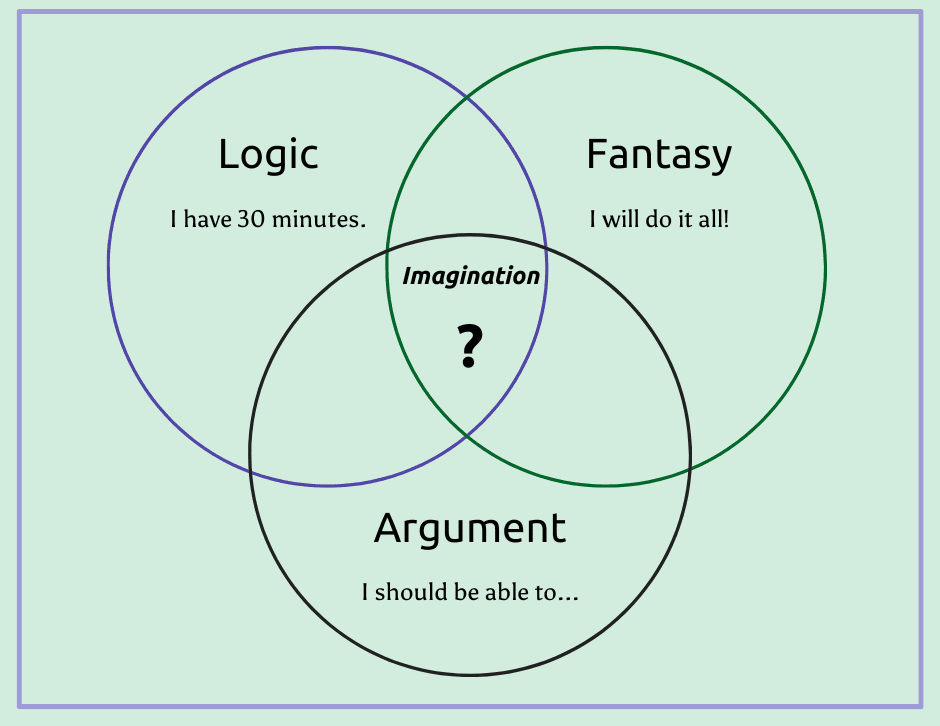I’ve been thinking a heck of a lot about time lately, due to a variety of experiences and upcoming events:
- My clients’ challenges with it;
- The course curriculum on coaching time that I’m currently working on;
- The time management panel I’m scheduled to moderate at the ICD Conference in September; and
- My own time (perhaps the least comfortable of the four).
When I set out to be a professional organizer eleven-ish years ago, I never imagined that organizing time wouldn’t be a part of the equation. After all, when people reach out for organizing assistance, at least one big reason for the outreach is not having enough time to manage things on their own. Or, at least, feeling like they don’t have time. Feeling like they don’t have enough space in their homes (they frequently don’t), but also thinking that somehow I’m going to magically create it for them. Like, I must know more about the possibilities of their garage than they do – and hopefully, those possibilities won’t result in having to get rid of much. Plus, we’ll knock out the whole thing in a few hours, right?
The challenge is two-fold:
- On a physical level, many of us are trying to cram more stuff in a closet than will logically fit.
- On the temporal level, many (most?) of us try to cram more activity into a unit of time (be it a minute, hour, day, or week) than will logically fit.
I think the latter is a more significant issue, perhaps because tasks, appointments, and projects are less tangible than extra shoes, purses, and pairs of jeans. We argue with the boundaries and limitations as if we have any control or say in the matter – like a toddler throwing a fit because the dog ate the pretzel they threw on the floor.
Isn’t it fascinating (and troubling) that the more we invent things to help us with our time and efficiency, the more problems we tend to have with time and efficiency? How many conversations do I have with people about “making” time for laundry, when there are two amazing contraptions in their homes explicitly designed to make laundry easier and faster?
The problem is, being able to wash clothes fast and efficiently implicitly gave us permission to buy more clothing (as did many other things). Say you were living in the 19th Century, heading down to the creek once a week to scrub your overalls against a rock and hang them to dry (tracking any potentially troublesome weather patterns that could get in the way); you likely weren’t going to try to maintain 20+ pairs of them. There were too many other things to be done for survival than mess with extra petticoats. But being more efficient tends to create gaps to fill with something else.
Further, marketing messages set up the fantasy that there’s a “right” way to do laundry – everything all folded pretty, those whites looking bright, colors popping, all stains magically eradicated. People who are on top of their $h!t get it all done every week in that just-right way, don’t they? Have you guys ever actually timed the whole process, start to finish? I don’t know about you, but I have better things to do than file-fold my T-shirts.* The biggest fantasy of all is that you can ever be “done” with laundry.
“That’s all you do?” Ah, nothing like some fresh 1970s mom guilt. But I digress…
If we pause for a moment to let the logic of our time boundaries sink in, we can accept that we must make some decisions.
Ick.
Yeah, sorry. We’re back to that pesky decision-making stuff. But I have an idea…
What might result if we gave some space for fantasy, maybe reframed it slightly as imagination? All logic and no fantasy make us dull creatures, doesn’t it? The trick is to embrace our own imagination instead of the visions of gurus, experts, and productivity geeks. Where does it take you if you imagine and fantasize about your tasks and time?
OK, so you might be saying, “Geez, Sara, I’m imagining that I’ll get through all of my emails, and the car will get washed, and I’ll have the house ready for the dinner party, and the project I’m dreading at work will disappear, and I’ll get my 10,000 steps in, all before the end of the day.”
Logically, you have the sinking awareness that it’s not all possible, at least in the short term. If you take care of your emails this morning, you probably won’t get around to washing the car. This fact disappoints you, and you don’t like being disappointed.
Imagine bigger. What does any of that stuff mean to you? The emails might connect to being a responsive, helpful person (which you do really love to be). Imagine what that responsiveness and helpfulness feel like when you finish pecking away on the keyboard. And that car wash – it might mean keeping up with the neighbor who is obsessive about his F-150, and when you stop to think about it, logically, you don’t care as much as he does. Maybe that task happens some other time. Or, perhaps you could imagine paying said neighbor’s kid to come over and wash the car for you.
A two-fer! Not only can you compare yourself with your neighbor, but who could resist a “High Speed Wizard” of a machine??
As Oliver Burkeman points out so beautifully in 4000 Weeks: Time Management for Mortals:
“…the more firmly you believe it ought to be possible to find time for everything, the less pressure you’ll feel to ask whether any given activity is the best use for a portion of your time.”
I get that the whole list doesn’t work out perfectly – it never will. That project might have to take precedence no matter what (and I’m not suggesting you imagine getting fired for ignoring it). You might play with some visuals to spark that imagination:
Your imaginative process might be a mind map, a handful of sticky notes, or something super cool that I would never think of. How would you and your time flow smoother if you accepted the logic of finite time, trusted your instincts, and mixed it all with a nice dose of creativity? If you’ve experienced that kind of time “management,” what was it like?
*It’s a bit of poetic justice that I’ve been running my laundry while I write this post (doing a little task layering :)). I have zero expectations of getting it all done, as I have other things I want to focus on today. But I’ll have enough done, and that’s a decision I will embrace.
p.s. I hope all you ICD and organizing friends out there will come for our panel in September!
p.s.s. Coaching friends, stay tuned for more info about the Holistic Time Coaching class through Coach Approach Training…






Sara, despite all the excellent wisdom in your post, the thing that really grabbed me is the old washing machine ad. My dad had an appliance business for most of my life, and he had a china tray that had a similar ad – if not the same one – on it. I wonder whatever became of that tray…
Isn’t that the coolest thing? I love seeing silly old ads like that, and I’m astounded at the old pricing (and the old messaging!). If you could find that old tray, I wonder what you would do with it? Thanks for commenting, Janet.
Excellent post, and an excellent reminder about the magical thinking I do when I don’t actually add up the time it’d take to complete all the to-do’s rolling around in my head!!
And the observation that our “time-saving” conveniences cause us to assume we have even more time now than we’d had before. And our unrealistic expectations for time “management” just increase!
Thanks, Merle! It’s quite a trap, isn’t it, to consider when we “save” time with technology, what we choose to fill that saved time with isn’t always helpful (and often more stressful).
Your Venn diagram is making me think about a principle of physical organizing: allow the container to determine how much of an item to keep. You know, the old “bag of bags” idea?
When it comes to my time, I typically let my calendar be my container. If I can’t realistically see how I can get it done, then I need to rethink. That is the imagining part for me… I need to see myself getting it all done!
I love thinking about “time containers,” because it gives us a tangible visual to consider. Calendars, timers, planners are all good ones (and I once wrote about time containers in a past blog post…maybe it’s time to update it). Thanks for your comment, Seana.
First of all, I’m so excited because I just registered for the ICD conference and can’t wait to attend the time management panel you are hosting! Plus, I’m excited about all the other sessions too. It’s been a ‘minute’ since I’ve attended an in-person conference.
I love your ideas about reimagining how we feel and approach time- a little bit of fantasy mixed with logic and reality. The idea of being 100% productive 100% of the time isn’t even possible. Thinking we can do more than the time we have also isn’t possible. But there is some happy medium between fantasy and reality. That’s where positive time awareness lives.
Hi Linda – I’m really looking forward to all of the sessions too. And now a bonus – getting to see you as well! I’m all about happy mediums, because we don’t have to take all the fun out of our approach to time. Thanks for stopping by The Stuff today.
I love thinking about how people in days gone by would have handled (fill in the blank).
I tend to list many more things to do in a day than can be realistically done. Then I work through them focusing on what I can layer as well as specific appointments.
Somehow, with a little mixing and matching everything that must be done – is and some other things as well.
I’m soooo looking forward to the ICD Conference and the Time Management Panel
A little mixing and matching – I like that. Sort of the Garanimal version of task management. Looking forward to seeing you at ICD, too – thanks for commenting, Diane!
I loved this post, Sara, and I’m going to get rid of so many of my petticoats! 😉
The Salvo commercial reminds me of the attitudes of the era (that haven’t quite gone away, only now everyone judges women for everything they’ve not gotten done, at work AND at home). We definitely do need a reality check, and the Burkeman quote hit me all over again, just like it did when I read the book. Those time-based fantasies really will take a bite out of our lives — the very bite we need to nourish ourselves to get things done! Imagination, based in logical reality will yield a better outcome, for sure. Great ideas here!
Glad I could provide a little inspiration for those excess underthings 🤣. Thanks for your thoughtful comment, Julie!
Ooh, a Venn diagram! I, like you, did not anticipate that I would end up helping people manage their time. Eventually I realized, and started telling clients, that in the end all organizing projects come down to time management: decluttering, organizing, maintaining new systems while also maintaining the rest of your life. Probably the most creative way I’ve come up with for time management (that I can think of right now) is what I call the Chinese Menu method. You know, pick one from column A, one from column B, and with six you get eggroll. I wrote a blog post about it once called “The Chinese Menu Time Management Technique” if you want to know more about that.
It’s all related, isn’t it? At least it is if we truly want to make progress and lasting change – who we are in all aspects of life is so important to consider (not just, “Oh I need a better to do list,” or “Or, I think I’ll try this planner and everything will be fixed!”). I’m very curious about the Chinese Menu method…will definitely check it out!
I like this idea, too, Hazel. Makes me think of two things. First, Robert Fulghum’s lovely reminder: ““Live a balanced life – learn some and think some and draw some and paint some and sing and dance and play and work everyday some.” Sweet. And harder to remember than I wish it were!
It also makes me think of Stephen Covey’s idea of seeing our lives in terms of no more than 5-7 roles we play — Husband, Dad, Professional ___, musician, etc — and to think in terms of serving each of those roles every week. (He suggests looking for an important but not-urgent way to be with each.) Neither works in its rigid form (not much does) but they’re nice reminders for me.
Thanks for a great post, Sara! Thought-provoking. OK, on to rethinking my impossible task list… 🙂
Yes, I’m not keen on rigidity (as you may have surmised). Thanks for the comment, and the kind words – and good luck with the list ;-)!
Excellent blog, Sara! I must say, when I started with residential organizing 15 years ago, I never considered that I would specifically be helping people with time management. It didn’t take me long before I realized how wrong I was! One of the things I realized over the years was that, if I didn’t weave in teaching some time management techniques while we were working on decluttering and organizing all that stuff, those beautiful spaces wouldn’t stay beautiful for very long. Now that I do a lot of that kind of work, especially with professional women, we run into the very attitudes that the laundry detergent ad displays – that if only we did it RIGHT – buy the right detergent, the right planner, download the right app – we could really do it ALL! As women, we’re constantly being told to “lean in” and get it all done all the time (and God forbid anyone should ever see us sweat it!) I think the whole “work life-personal life balance” thing for women is finally unraveling and we’re realizing that you can lean in all you want, but it’s more about sway than balance. More about perspective than perfection. I love Shonda Rhimes’ Dartmouth graduation speech about acknowledging the reality of it all – https://vimeo.com/562164742. Thanks for an eye-opening post!
I love your phrase – “more about sway than balance.” There’s really no time that true balance occurs, at least in my experience. Learning to let go of those expectations and attitudes is really freeing, though. Maybe if we embrace the lesson, we could not only sway, but dance? Thanks for the comment and the link, Lisa!